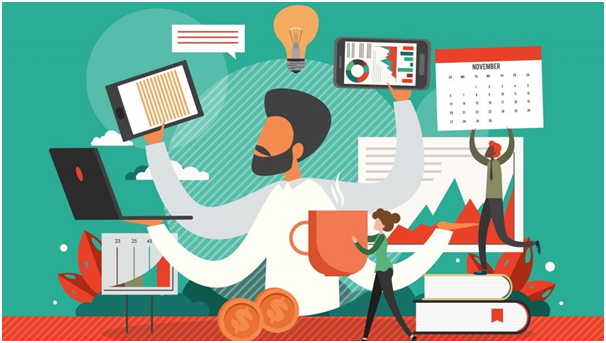Hustle Culture
Context: Recently a senior vice president of a big company said that those who say you shouldn’t work weekends and all, have probably never tasted what amazing work looks like. Social media influencers such as Kusha Kapila criticised the idea of overworking for professional success — popularly known as hustle culture. She said, “As someone who has worked exactly like this since 2016, I can tell you that other than high-functioning depression and triggering my ADHD, this hustle has completely destroyed the idea of a life outside of work for me. I am not saying it’s not rewarding but the burnout is real.”
Rise of Hustle Culture
- In recent years, especially with the rise of entrepreneurship and start-up culture, more and more individuals have embraced hustle culture, believing hard work and determination can turn every dream into reality.
- Social media platforms like Instagram, YouTube and Twitter are filled to the brim with lifestyle gurus and motivational speakers promoting the philosophy of ‘Rise and Grind’.
- They claim that slogging for 18 hours a day, maintaining a positive mindset and a never-give-up attitude are key to reaching the top.
- Hustle culture, however, has its pitfalls. Several studies have shown that overwork can not only lead to early-age burnout but also severely damage the physical and mental health of people.
- Moreover, many believe that hustle culture is just a trick of the giant corporations and capitalists to make their employees work harder and help them pocket more profits without giving high salaries and ensuring social benefits.
What is hustle culture?
- The word hustle comes from the Dutch word husselen, which means “to shake or toss”. As it became part of the English lexicon, it soon took on extended meanings like “to crowd or push roughly,” “to obtain by energetic activity,” and “to obtain money by fraud or deception”.
- But it wasn’t until the late 19th and early 20th century that hustle started to be associated with hard work.
- A report published by NPR mentioned “A 1914 job ad from The Chicago Defender, an African American newspaper, said delivering the paper was an ‘easy task’ for ‘any wide-awake boy with a little hustle in him.’”
- Around the same time, the term began to be used to associate blackness with laziness.
- African Americans who failed to “make it” were blamed for not knowing how to hustle or considered lazy.
- The NPR report said, “This idea—that black people struggle due to their own failures, rather than systemic oppression — was widespread.”
- However, over time, hustle got absorbed into American Black culture and artists, especially rappers, started glorifying the word by relating it to resilience and self-empowerment.
- “But importantly, their (rappers) lyrics acknowledged that hustling was what black people needed to do to survive in a rigged system.
- The work itself—selling drugs, working long hours, taking on multiple side-gigs—was not glamorous. Instead, the strength and ingenuity needed to toil through this hard work was what was glorified,”
- As has happened often, once corporations saw the potential in using the word for advancing their own interests, they co-opted it and stripped its association with blackness. What was earlier seen as a survival strategy for black people, became a mantra for increasing productivity and ensuring professional success.
- One of the first ones to appropriate the term in the late 2010s was a Belarusian-American entrepreneur and CEO, Gary Vaynerchuk, who has written several self-help books, promoting the mentality of constantly working and striving for success.
- For him, hustling is synonymous with doing multiple jobs at a time and working for almost 20 hours a day — not for survival but to reach the upper echelons of fame and glory.
- In one of his books, Vaynerchuk says, “Wake up before everybody else and work into the night. Hustle”.
Is hustle culture sustainable?
- One of the biggest criticisms of modern-day hustle culture is that it encourages the myth of meritocracy, propagating that success and power can be won by anyone on the basis of merit, not social origins.
- Also, the entrepreneurs and self-help influencers who are promoting it, disregard the fact that for a large number of people, hustling isn’t even a choice.
- In 2021, a study published by authors from institutions including the World Health Organization (WHO) and the International Labour Organization (ILO) suggested that each year, three-quarters of a million people are dying from ischaemic heart disease (also known as coronary heart disease) and stroke, due to working long hours, defined as 55 hours or more per week.
- According to the BBC, it means that more people are dying from overwork than from malaria.
- Another study done by Deloitte, which involved 1,000 full-time US professionals, found that 77 per cent of people have experienced burnout at their job and 42 per cent have left their jobs because they felt burned out.
- Numerous experts and health professionals have pointed out the need for a healthy work-life balance. They believe while working hard is crucial, it doesn’t mean one has to work nonstop — rest and relaxation are also important for both physical and mental well-being.
With the outbreak of the coronavirus pandemic, people have also reevaluated their relationship with work. In April 2021, LinkedIn surveyed more than 5,000 of its users over two weeks and noted 50 per cent and 45 per cent of respondents said that hours or location flexibility and work-life balance respectively have become more important to them since the pandemic.
| Practice Question
1. “Those who say you shouldn’t work weekends and all, have probably never tasted what amazing work looks like”. Critically Evaluate. |




